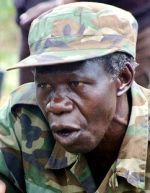Ugandan rebels say fight is over after 19 years of war
Aug 28, 2006 (KAMPALA) — Rebel leaders who have lived in Uganda’s shadows for 19 years went on local radio with a special announcement: As of Tuesday, the fight is over; the time has come to begin the journey home.
 After cutting off the tongues and lips of thousands of innocent civilians, after abducting and enslaving tens of thousands of children, after driving millions of people from their homes, the fighters of the Lord’s Resistance Army said they will stop fighting Tuesday, ending one of the most brutal conflicts in the world.
After cutting off the tongues and lips of thousands of innocent civilians, after abducting and enslaving tens of thousands of children, after driving millions of people from their homes, the fighters of the Lord’s Resistance Army said they will stop fighting Tuesday, ending one of the most brutal conflicts in the world.
Lord’s Resistance Army rebels and Ugandan officials signed a truce Saturday that gives the rebels three weeks to gather at two remote villages in largely uninhabited areas of southern Sudan. The truce takes effect at 9 a.m. Tuesday (0600 GMT).
If the deal takes hold, it would be a major breakthrough in bringing peace to the border area that joins northern Uganda, eastern Congo and southern Sudan. Rebel groups from all three countries operated across the borders with impunity for decades until a peace deal for Congo was reached in 2003 and southern Sudanese rebels joined the government in 2005.
A peace accord in northern Uganda would open the region to greater oil and mineral exploration as well as allow millions of refugees to return to their farms.
The Lord’s Resistance Army was formed from the remnants of a northern Uganda rebellion that began in 1986, after President Yoweri Museveni, a southerner, overthrew a brutal military junta. Rebel leader Joseph Kony mixed northern politics with religious mysticism, declaring himself a Christian prophet fighting to rule the country by the Ten Commandments.
About 20,000 children have been abducted during the northern Uganda conflict, the U.N. estimates, and some 1.7 million people displaced from their homes. The rebels turned boys into soldiers and the girls into sex slaves for rebel commanders.
The International Criminal Court has issued arrest warrants for Kony and four other rebel leaders, but the Ugandan government has offered them amnesty in return for giving up their insurgency, which has left thousands of civilians dead. An exact death toll isn’t known.
The truce, officially called a cessation of hostilities, doesn’t include details on disarming the rebel fighters or integrating them into Ugandan society. Those terms will be part of a final peace deal expected to be reached at talks mediated by southern Sudanese leaders in Juba, Sudan.
African Union-appointed military officials, together with the Ugandan government and the rebels, will monitor the truce. They will report to the chief mediator, southern Sudan Vice President Riek Machar.
Vincent Otti, the deputy leader of Lord’s Resistance Army, spoke to Mega FM, based in the main northern Uganda town of Gulu, to provide his men with details of the truce.
“Otti called us yesterday (Sunday) and made an announcement to his fighters,” said David Okidi, station manager at Mega FM. “He told them to gather where the two main commanders are. They will then proceed together to the assembly point.”
The rebel fighters have split into dozens of small groups, each raiding villages for supplies and rarely fighting government troops directly. Some rebel units might not learn of the truce for days or weeks.
“We don’t expect to see a mass movement tomorrow,” Chris Magezi, army spokesman for northern Uganda, said Monday. The rebels “do not have the confidence to move openly, so they will probably go secretively in groups on foot.”
Magezi said he expected rebels to begin arriving in Owiny-ki-Bul, in southern Sudan’s Eastern Equatoria state, in about a week’s time because of the distances involved. Owiny-ki-Bul is about 30 kilometers from the border and on the eastern side of the Nile. The other assembly point is in Ri-Kwangba in Western Equatoria State, on the western side of the Nile.
Kony, who has only been seen in public a handful of times during the 19-year insurgency, and the other top commanders wanted by the International Criminal Court, will assemble along with other fighters, the group’s top negotiator said Sunday.
Human rights groups have condemned Museveni’s amnesty offer to the rebels, but he has argued that peace is more important than an international trial.
(AP/ST)
